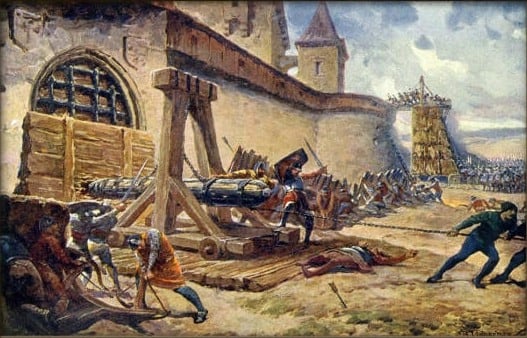hustý
12.11. 1420 Žižka conquered Prachatice
Categories: Years of war and revolution , Calendar

On Tuesday, 12 November 1420, the Hussite army stood in front of the repaired and fortified walls of Prague, consisting of a belt of fortifications and two gates. When the defenders of the city rejected Žižek's call to open the gates, the enemy deserved no mercy...
The building of Tabor and especially the transformation of Písek into a Hussite fortress posed an acute threat, especially to the Catholics of Prachatik. The very first military campaign of the emerging Tabor Union could not miss Prachatice due to its strategic and commercial importance. A unique chronicle report states succinctly that on Thursday 25. The formulation about the burning of the town is clearly exaggerated and probably refers to several buildings.
We know from elsewhere that the Taborites also partially destroyed the city wall at that time. The city itself returned to the control of the Hussite townsmen, who drove out the opponents of the chalice and refused to beJuly 1420 to the Visegrad Chapter and the crowned Czech King Sigismund of Luxembourg.
"The proof is given by Sigismund's challenge, dated 12. August 1420 and commanding Prachatický and other subjects of the Vyšehrad provosthood to maintain obedience to Albík of Uničov. The famous physician remained on the Catholic side, but soon left Bohemia and worked first in Wrocław and at the end of hishis life as Sigismund's personal physician in Buda," writes Petr Čornej in his book Hussites and Hussites.
The struggle for Prachatice continued in the following weeks. At the end of the summer of 1420, the wheel of fortune turned again and brought to power the local Catholics, who managed to penetrate the town and expel the Hussite leaders. This may have happened sometime in early September, perhaps on the day of the Nativity of the Virgin Mary, which became entrenched in the local consciousness and was perhaps later mistakenly associated with Žižek's victory.
The first days of September are also suggested by the report of the capture of Ondrej of Výrovo, a village in the vicinity of Husinec, a former bell-ringer from Prachatice. The Catholics surprised him while he was working in the fields, dragged him away and burned him, allegedly because of his iconoclastic deeds. Two other Hussites suffered the same fate. The Hussites from Prachatice, who had probably found asylum in Písek, were not going to accept the situation and were planning to be taken away. They got it when Žižka was strong enough to attack Prachatice.
This circumstance also rules out a second conquest of the town in the first decade of September. On about 10 or 11 November Žižek's army withdrew from Písek and on Tuesday 12 November stood in front of the repaired and fortified Prachatice walls, consisting of a belt of fortifications and two gates. When the defenders of the city waved away Žižek's appeal to open the gates, loosed the lay chalice and the four articles of Prague, and thus saved their lives, the two advancedthe warrior in accordance with the traditional code of chivalry, which traces its roots to the ancient Orient. The enemy who refused the offer of surrender deserved no mercy.
"On 12 November 1420, Žižka issued an order to massacre the conquered Prachatice, and when Vodňany also fell into his hands, he had two captured priests and a number of local townspeople thrown into a burning lime kiln near Budějovice. His aim was to create terror and to dominate the dominions of the mighty Rožmberk, who was constantly trying to threaten the Hussite Camp," writes Vladimír Liška in his book The Mystery of Czech Chronicles, Legends and Myths.
Sources.
The article is included in categories:



